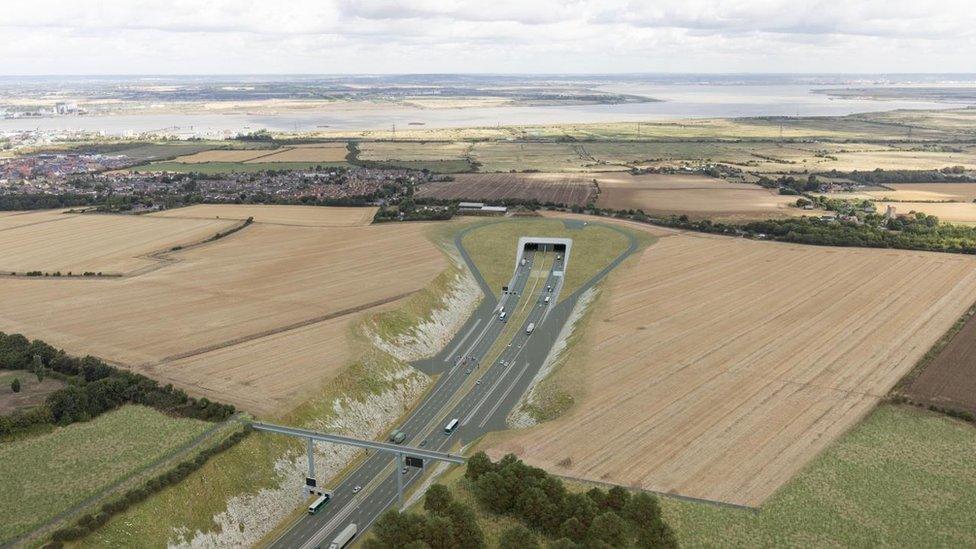Climate change: Lower Thames Crossing CO2 impact figures revealed
- Published
A video released in 2018 showed the original plan for the crossing in virtual form
A new tunnel linking Kent and Essex will create five million tonnes of carbon dioxide (CO2), figures suggest.
Estimates say building the Lower Thames Crossing (LTC), a flagship project in the UK's roads programme, will emit 2 million tonnes of the greenhouse gas.
Meanwhile, traffic created by the road is expected to generate another 3.2 million tonnes over 60 years.
Environmentalists say the statistics make a mockery of the prime minister’s claim to lead on climate change.
A government report published in March provisionally estimated the UK's net carbon emissions in 2019 to be 351.5 million tonnes.
The Thames crossing, external is said to be the UK's biggest roads project since the M25.
Ministers say the scheme, supported by the CBI and the AA, will bring a huge economic boost on both sides of the river and relieve congestion on the orbital motorway.
But the emissions figures, obtained through a Freedom of Information request, external after Highways England initially declined to release them, have angered environmentalists.
Campaigners say the tunnel should never have been proposed without a debate on the projected CO2 impacts, and have demanded the government freeze all projects that will increase emissions.
PM 'making mockery of promises'
Environmentalists have been campaigning for the Highways Agency to publish a CO2 analysis of its full road-building programme.
Other schemes will also generate CO2, such as the planned Stonehenge tunnel, which is expected to create half a million tonnes during construction.
Chris Todd, from green group Transport Action Network, told BBC News: “If the government is serious about tackling climate change, it can't keep ignoring the emissions roads are causing".
Boris Johnson, who will host a global climate conference on Saturday, has pledged to cut the UK’s emissions by 68% against 1990 levels) by the end of this decade.
He’s encouraging other nations to follow suit with ambitious offers as the climate warms.
Mr Todd said: “We welcome greater ambition from the PM on the international stage, but it’s very easy to make announcements without taking action – and right now transport policy is making a mockery of his promises.”
The eventual CO2 outputs for the roads should be lower than projected because of the advent of electric cars. But campaigners point out that making and running EVs still takes a great deal of energy and resources.
Mega projects, mega emissions

The tunnel, shown here in a computer-generated image, is designed to reduce congestion elsewhere
This row is part of a bigger critique of the UK’s whole infrastructure programme.
The Prime Minister is an enthusiastic supporter of eye-catching concrete-heavy projects. But these typically carry a high carbon cost.
Meanwhile other less telegenic forms of infrastructure create more jobs than mega-projects, and quickly start to save CO2 emissions overall.
Refurbishing homes, for instance, is estimated to create four times more jobs than road building.
Improving broadband can take cars off the road, according to the AA, by improving employees' ability to work from home.
This also meets the wish of Transport Secretary Grant Shapps, who says more people need to switch away from their cars.
In his recent statement, the Chancellor promised £27bn to roads, £100bn to HS2 and just £1bn next year for his Green Homes Grant to insulate dwellings.
A Highways England spokesperson told BBC News: "The Lower Thames Crossing is the UK’s most ambitious roads project in a generation, which will add billions to the national, regional and local economies by almost doubling road capacity between Kent and Essex and reducing delays.
“But it will also impact on the environment and minimising this impact is a key priority for us. Our proposed design includes the UK’s longest road tunnel as it offers the best possible local environmental benefits,
“However, tunnels by their nature require large volumes of concrete with a high carbon footprint.”
Highways England told BBC News it has changed construction methods to reduce emissions.
Follow Roger on Twitter, external